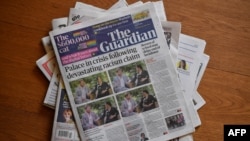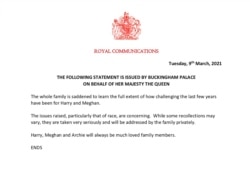“The monarchy is above reproach,” British Prime Minister Boris Johnson confidently declared a year ago. This week, following excoriating allegations by the Duke and Duchess of Sussex about the royal family, the British leader seemed more restrained.
Johnson told reporters midweek that he has the “highest admiration” for Queen Elizabeth but would not comment on other royal family matters — a position his top Cabinet ministers are adopting in the wake of the much publicized, two-hour interview with Harry and Meghan, as the duke and duchess are called, by media mogul Oprah Winfrey in which issues of race and family dynamics were raised.
Johnson told lawmakers in the House of Commons, “When it comes to matters to do with the royal family, the right thing for prime ministers to say is nothing, and nothing is the thing that I propose to say.”
Other Britons are being less circumspect in their reaction to a combustible broadcast in which Meghan, an American and a former actress, alleged that an unnamed member of the royal family expressed “concerns” about the skin color of the couple’s first child, Archie, before his birth.
Meghan also claimed that the distress of life as a member of Britain’s storied first family drove her to suicidal thoughts until the couple withdrew from royal duties and moved to the United States.
She claimed the royal household had been unfriendly and dismissive of her deteriorating mental health and was unhelpful in her plea for medical assistance. Harry professed that his family said nothing publicly to counter what he saw as racist coverage of his wife in Britain’s tabloid press.
Generational divide
The interview has split Britons largely along the same political and demographic fault lines as Brexit, feeding seemingly into a culture war over British identity, self-image and traditions.
Since the broadcast, polls show that people over 55 years old are more likely to support the royal family and are suspicious of Meghan’s self-portrayal as an innocent ingénue and victim of a cold-hearted royal family.
Younger Britons, especially those in their 20s, are much more likely to believe the couple’s claims about the toxicity of the royal family and to sympathize with Meghan’s claims of racism. They see her alleged treatment as a reflection of a more widely discriminatory country.
An outright majority of the over-65-year-olds believe the couple have been treated fairly by the royal family, while 61% percent of 18-24-year-olds believe Harry and Meghan were not, according to a YouGov poll.
Conservative voters are more likely to side with Buckingham Palace. Labor and Liberal Democrat supporters align more with Harry and Meghan.
Buckingham Palace officials have drawn some comfort in another post-broadcast opinion poll, conducted for the Daily Mail newspaper, that suggests most Britons think the Duke and Duchess were wrong to have given their explosive interview, that they have let down the queen and should be stripped of their royal titles.
But the poll also showed the interview may have damaged the queen's reputation, with her popularity falling.
The clear generational divide over the interview suggests there may be problems ahead for the heir apparent, Prince Charles, who will need to reconnect with younger people if the future of the monarchy is to remain assured, royal commentators say.
That is “now his defining challenge,” said Daniel Finkelstein, a columnist for The Times newspaper.
Some commentators sympathetic to Harry and Meghan, as well as younger Britons, say the royal family missed an opportunity to future-proof the monarchy by using the couple’s more contemporary and progressive appeal to help the hereditary institution transition from 94-year-old Elizabeth to Charles, and subsequently, to his elder son, Prince William.
Since the interview, Britain’s social media platforms, newspapers and broadcasting studios have been dominated by often-intemperate debates about Harry and Meghan versus the royal family.
The raging rhetoric has already claimed one media job with the departure of TV host Piers Morgan, who left “Good Morning Britain” after more than 40,000 viewers complained about his vitriolic dismissal of Meghan’s allegations, which he called a “diatribe of bilge.”
Palace response
Buckingham Palace has clearly sought to avoid fueling the furor with a restrained three-paragraph statement that emphasized the royal family’s continuing love for the estranged couple and their son and registered the royals’ sadness in learning of the anguish Meghan said she endured.
It also said the family is ready to address as a private matter the issues raised in the interview, including race.
The statement also had a hint of a bite, noting that “some recollections may vary” between the royal family’s and those of the aggrieved couple. Nonetheless, the personal tone of the statement was an “attempt to shut down the public debate,” royal commentator Rhiannon Mills told viewers of Sky News.
Other analysts say the palace seems determined to avoid a repeat of the so-called "briefing war" that was waged by Harry’s parents, Prince Charles and Princess Diana, after their marriage collapsed. Charles, Diana and their staffs leaked venomous allegations against each other to try to manipulate press coverage of their tumultuous separation and acrimonious divorce.
On Thursday, in answer to a shouted question during a royal visit, William refuted the notion that the royal family is racist. William also said he had not yet spoken to his brother but would do so.
Whether Buckingham Palace’s statement cools the determination of those ready to wage a culture war over the royal dispute remains to be seen.
Politicians remain cautious
Johnson is not alone among most British politicians to remain wary of engaging too closely in the public debate over the interview, which they fear has the potential to go off in political directions that are hard to predict.
“It is never wise for a family dispute to be aired in public,” Conservative lawmaker David Amess said.
Some members of the country’s main opposition Labor Party have engaged more, seeing some potential advantage in expressing clear sympathy with the so-called “royal dissidents.”
But Labor leader Keir Starmer has been cautious in his remarks, saying he was sorry for the royal turmoil, while offering that the issues raised by Meghan about racism and mental health are serious.
“This is bigger than the royal family. For too many years, we have been too dismissive and too willing to put these issues to one side,” he said.
In private, some of Johnson’s ministers have expressed frustration over the timing of the royal dust-up. They say it distracts public attention from the success of Britain’s rollout of coronavirus vaccines and the planned easing this month of pandemic restrictions, which they hope will exorcise public anger over what many see as a bungled handling of the pandemic last year.
More worryingly, they say, a race debate risks tarnishing the post-Brexit image the Johnson government has been marketing of a global and modern Britain ready to embrace the world.






